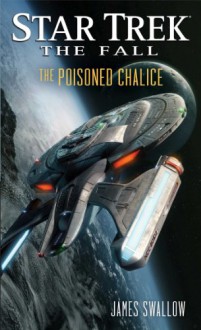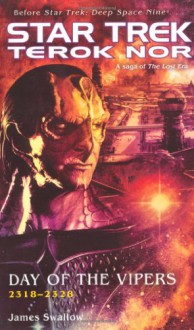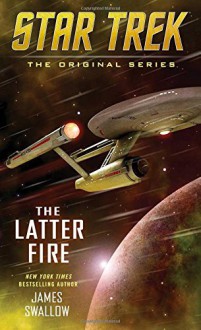
This is an anthology of stories set within the various seasons of TNG and the movies. Overall a good reading experience, even if the quality of the stories differs.
I read the framing stories, Meet with Triumph and Disaster/Trust Yourself When All Men Doubt by Schuster & Mollmann, as one story - I didn't quite know what to make of the first story until I read the conclusion, got the hint about Tapestry and of course Wolf 359. It's still not one of my favourite stories but it ultimately worked well enough for me.
Acts of Compassion by Dayton Ward & Kevin Dilmore is a good story, but unfortunately not the extraordinary one I'd have liked to read. Maybe it was just too straightforward, no twists in loyalties, no surprises... but it was nice to "see" Tasha once again.
Redshift by Richard C. White is an average story - the downside is that Pulaski's mannerisms were a bit over the top for my taste. At least she got some slap on the wrist until, of course, her ideas about the drills save the day... but throughout season 2 she was the odd one out, she just didn't fit in - and this story does nothing to remedy or explain that fact.
Among the Clouds by Scott Pearson absolutely reminded me of the Temeraire books, the living ships, the aerial battles - a very interesting premise, superbly executed, a definitely fitting contribution to a TNG-anthology.
Thinking of You by Greg Cox... Well, at first I thought "Urgh, Lwaxana *and* Barclay?!?" I never cared too much for either character but Cox managed to play on all the eccentricities of both characters, the duo just works, and add Ro to the mix - and set the whole thing on a holodeck with frogs as opponents, lots of bugs etc, stir well and you get a real page turner. Definitely one of my favourites here.
I also enjoyed Turncoats (by Susan Schwartz) quite much although I have to admit that I quite forgot all the Romulan characters Schwartz and Sherman introduced in their Vulcan's XY books (and I so far haven't even read the Vulcan's Soul trilogy) - so I liked the follow-up to "Face of the Enemy" which is my favourite Troi episode, but I couldn't appreciate all the nods to her created miniverse, something I'll remedy once I had the time to read Vulcan's Soul.
Ordinary Days by James Swallow: I admit to once upon a time watching TNG also because of Wesley - granted, he was badly written, but then I could simply relate to him in a way I couldn't to any of the other characters. Of course, that changed when I grew older and I always hoped to see more of him in the light of "First Duty"... trying to fit in, getting into the wrong group, peer pressure etc. So I very much appreciated this little glimpse into an alternative universe where he's not the genius who lives up to his promise, but rather someone who desperately tries to fit in, to be ordinary, to find his way on a path that's not so clearly defined and makes some poor choices. While the setting intrigued me, I have to agree with Trent that this story ultimately missed the opportunity to actually show the impact of Wesley's decisions. Perhaps the focus shouldn't have been so much on Wesley himself, but on the crew dealing with his choices, questioning themselves perhaps why Wesley made his choices of leaving everything behind, and why Picard and Data die (just because Wesley wasn't there doesn't mean no one else is brilliant enough to come up with ideas that work after all)... I'd have loved to see an Enterprise where Wesley isn't expected to live up to promises of geniality but allowed to be an ordinary adolescent without being forced in a certain direction. One doesn't exclude the other, after all. That's what I, now as a grown-up, criticize most about his treatment in TNG and to a lesser degree in this story. There has to be some sort of middle way between the boy-genius and the rebellious/ostracized Wesley of this story. And I also agree that the ending seemed a bit abrupt, though I really enjoyed reading the way the Traveler influenced Wesley's life up till Dorvan. All the criticism aside, I actually liked "Ordinary Days" quite much... and given the restraints of 30 pages it tells an interesting and gripping story. But I think the premise would have warranted a story of the likes of Myriad Universes.
'Twould ring the Bells of Heaven by Amy Sisson was a bit too predictable a story to me. I thought it obvious that those rings were a lifeform. Troi's angsting didn't quite grip me but at least I wasn't annoyed by it, either - though some of her decisions were a bit too random to actually make sense at the time she made them. And Data's monologue/PoV was a bit too reminiscent of Geordi's of just a few stories before.
Usually, Christopher L. Bennett's writing style doesn't really agree with me - but Friends with the Sparrows was a phenomenal exception. I loved going back to the Tamarans and their language, the use of Data and his emotion chip - and the way some still see him more as a tool than a sentient being... Well, there's nothing to criticize about this story at all. Along with "Thinking of You" definitely the highlight of this anthology.
Suicide Note by Geoff Trowbridge worked well enough for me - but like "Turncoats" I guess I'll appreciate it even more once I've rewatched the relevant TNG-episode.
Four Lights by Keith R. A. DeCandido is a bit the opposite to "Friends with the Sparrows", a story that I was very much looking forward to, but that then didn't quite work for me as well as I had hoped for - perhaps it's the "stylistic quibble"... I'm not fond of a 1st person PoV, neither of present tense used in stories which both distracted me a bit too much of the confrontation between Picard and Madred. Oh, I absolutely loved Madred's mind games, and Picard's obsession but somehow I'd have wished for - well, more of a defeat of Madred's at the hand of Picard, not just Picard's common sense once again reasserting itself. Of course, rationally I realize that Picard practically had no other choice than to step back from the interrogation in order not to lose himself once again, and recognizing that was Picard's victory - but it did feel as though Madred's won again... Ultimately that ambivalence came across in a very poignant manner, but still I found that this story somehow lacked KRAD's usually easy style that just sucks one into the story and doesn't let up till the finish.
'Til Death by Bob Ingersoll & Thomas F. Zahler... well, the picture of Riker running around with a gaping hole in his chest has some merit, but somehow it reminded me a bit too much of Spock missing his brain. But I, too, loved Riker's final message and the way he ultimately defeated his opponent. I have to admit that Riker's not my favourite character, he's too much overshadowed by Picard and, especially in the movies, Data - but I always loved his ability to think beyond the obvious and to turn disadvantages into advantages... as he does here. And kudos to the writers for not going down the most obvious road and pair him up with Deanna on this mission but with Crusher. And so, a story that I had lost all hope for right at the beginning turned out to be a very pleasant surprise.
I enjoyed On the Spot by David A. McIntee quite a bit - definitely not because of the little plot to destroy the Enterprise, but... well, it's a simple story, set in the aftermath of Data's death, and it actually deals with this aftermath. Worf lost a friend (and 2 others with Riker and Troi's transfer), he's suddenly dealing with a job that he never wanted... and then there's Spot, a cat that finds itself on loose ends. Both, Spot and Worf are creatures of habit - and both find themselves in new situations and don't quite know how to deal with that. Spot's, of course, only the focal point, the real development's with Worf - and I have to say that I definitely find this development credible and well told.
~~
review originally written in 2009


 Log in with Facebook
Log in with Facebook 








